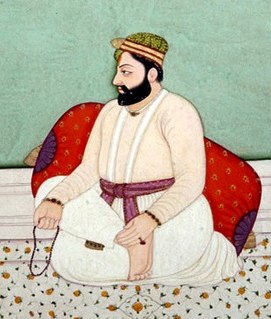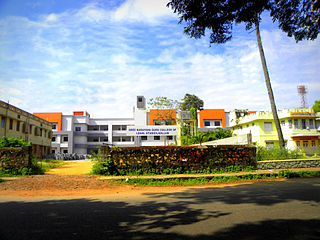Sikhism, or SikhiSikkhī, pronounced [ˈsɪkːʰiː], from Sikh, meaning a "disciple", "seeker," or "learner") is a monotheistic religion that originated in the Punjab region in the northern part of the Indian subcontinent around the end of the 15th century. It is one of the youngest of the major world religions, and the world's fifth largest organized religion, as well as being the world's ninth-largest overall religion. The fundamental beliefs of Sikhism, articulated in the sacred scripture Guru Granth Sahib, include faith and meditation on the name of the one creator, divine unity and equality of all humankind, engaging in selfless service, striving for justice for the benefit and prosperity of all, and honest conduct and livelihood while living a householder's life. In the early 21st century there were nearly 25 million Sikhs worldwide, the great majority of them living in Punjab, according to the Encyclopaedia Britannica.
Guru is a Sanskrit term for a "teacher, guide, expert, or master" of certain knowledge or field. In pan-Indian traditions, guru is more than a teacher, in Sanskrit guru means the one who dispels the darkness and takes towards light, traditionally a reverential figure to the student, with the guru serving as a "counselor, who helps mold values, shares experiential knowledge as much as literal knowledge, an exemplar in life, an inspirational source and who helps in the spiritual evolution of a student". A guru is also one's spiritual guide, who helps one to discover the same potentialities that the guru has already realized. In the Tagalog language, Indonesian and Malay the word means teacher.

Padmasambhava, also known as Guru Rinpoche, was an 8th-century Buddhist master from the Indian subcontinent. Although there was a historical Padmasambhava, little is known of him apart from helping the construction of the first Buddhist monastery in Tibet at Samye, at the behest of Trisong Detsen, and shortly thereafter leaving Tibet due to court intrigues.

Narayana Guru was a spiritual Sage and social reformer of India. Born into a family of the Ezhava caste in an era when people from such communities, which were regarded as Avarna, he led a reform movement in Kerala, against the injustice in the caste-ridden society of Kerala. to promote new values of spiritual freedom and social equality. His efforts were reported to have been a major influence in several social reforms in Kerala.
A Gurdwara is a place of assembly and worship for Sikhs. People from all faiths, and those who do not profess any faith, are welcomed in Sikh gurdwaras. Each gurdwara has a Darbar Sahib where the current and everlasting guru of the Sikhs, the scripture Guru Granth Sahib, is placed on a takhat in a prominent central position. The raagis recite, sing and explain, the verses from the Guru Granth Sahib, in the presence of the congregation.

Guru Gobind Singh (5 January 1666 – 7 October 1708), born Gobind Rai, was the tenth Sikh Guru, a spiritual master, warrior, poet and philosopher. When his father, Guru Tegh Bahadur, was beheaded for refusing to convert to Islam, Guru Gobind Singh was formally installed as the leader of the Sikhs at age nine, becoming the tenth Sikh Guru. His four sons died during his lifetime – two in battle, two executed by the Mughal army.

Guru Hargobind, revered as the sixth Nanak, was the sixth of ten Gurus of the Sikh religion. He had become Guru at the young age of eleven, after the execution of his father, Guru Arjan, by the Mughal emperor Jahangir.

Guru Tegh Bahadur, was the ninth of ten Gurus of the Sikh religion. Tegh Bahadur continued in the spirit of the first guru, Nanak; his 116 poetic hymns are registered in Guru Granth Sahib. Guru Tegh Bahadur prevented conversions of the Kashmiri Pandits and non-Muslims to Islam, and was publicly beheaded in 1675 on the orders of Mughal emperor Aurangzeb in Delhi for himself refusing to convert to Islam and saving Kashmiri pandits and other non-Muslims or as viewed by Muslims that he was condemned to death for waging war but was offered at last moment that converting to Islam will save him, which he declined as he wanted to be in Sikh rehat till his last breath. Gurudwara Sis Ganj Sahib and Gurdwara Rakab Ganj Sahib in Delhi mark the places of execution and cremation of the Guru's body. The martyrdom of Guru Tegh Bahadur is remembered as the Shaheedi Divas of Guru Tegh Bahadur every year on 24 November, according to the Nanakshahi calendar released by the Shiromani Gurdwara Parbandhak Committee in 2003.

Kelucharan Mohapatra was a legendary Indian classical dancer, guru, and exponent of Odissi dance, who is credited with the revival and popularizing of this classical dance form in the 20th century. He is the first person to receive the Padma Vibhushan from Odisha.

The Sikh gurus established Sikhism over the centuries, beginning in the year 1469. Guru Nanak was the first Guru, and subsequently, each Guru, in succession, was referred to as "Nanak", and as "Light". All the Gurus themselves also used the name "Nanak" while penning down their spiritual verses.

Mohammad Afzal Guru was a Kashmiri separatist, who was convicted for his role in the 2001 Indian Parliament attack. He received a death sentence for his involvement, which was upheld by the Indian Supreme Court. Following the rejection of a mercy petition by the President of India, he was executed on 9 February 2013. His body was buried within the precincts of Delhi's Tihar Jail. Amnesty International has questioned his sentence stating that he did not receive adequate legal representation and that his execution was carried out in secrecy.

Guru Mani Madhava Chakyar was a celebrated master performance artist and Sanskrit scholar from Kerala, India, considered to be the greatest Chakyar Koothu and Koodiyattam artist and authority of modern times. He was considered as the authority of Abhinaya and Nātyaśāstra.

Sadhguru Jaggi Vasudev, often referred to as simply Sadhguru, is an Indian yogi, mystic, and author. He founded the Isha Foundation, a non-profit organization which offers Yoga programs around the world and is involved in social outreach, education and environmental initiatives. His books have appeared in The New York Times Best Seller list in multiple categories like "Health", "Religion, Spirituality and Faith", and "Advice, How-To & Miscellaneous". Sadhguru Jaggi Vasudev has been a primary speaker at the Headquarters of the United Nations, World Economic Forum, Australian Leadership Retreat, Indian Economic Summit and TED. He has also spoken at various educational institutions including, Oxford University, Stanford University, Harvard University, Yale University, Wharton University, London School of Economics and Massachusetts Institute of Technology. He has also been a speaker at Google. Sadhguru was conferred the Padma Vibhushan civilian award by the Government of India in 2017 in recognition of his contribution to the field of spirituality.
In Sikhism, only lacto-vegetarian food is served in the Gurdwara Sikhs are bound to be meat-free. The general consensus is that Sikhs are not supposed to eat meat because doing so would harm another living being Sikhs, once they become Amritdhari (baptised) via the Amrit Sanchaar, are forbidden from eating Kutha or ritually-slaughtered meat because it transgresses one of the four restrictions in the Sikh Code of Conduct.

Koel Mallick is an Indian film actress who appears in Bengali. She is the daughter of actor Ranjit Mallick & Deepa Mallick. Her debut film was Nater Guru.

Guru Nanak was the founder of Sikhism and the first of the ten Sikh Gurus. His birth is celebrated worldwide as Guru Nanak Gurpurab on Kartik Pooranmashi, the full-moon day in the month of Katak, October–November.

Kaduvetti Guru, also known as J. Gurunathan and J. Guru and Maveeran J. Guru, was an Indian politician who was twice elected as a Member of the Legislative Assembly in Tamil Nadu.

Guru Arjan 15 April 1563 – 30 May 1606) was the first of the two Gurus martyred in the Sikh faith and the fifth of the ten total Sikh Gurus. He compiled the first official edition of the Sikh scripture called the Adi Granth, which later expanded into the Guru Granth Sahib.

"Atmopadesa Śatakam" is a Malayalam spiritual work by Narayana Guru in the form of a poem. It is considered as the classic work of Narayana Guru, who was a social reformer and spiritual leader of Kerala, India. The literal translation of the title means "One Hundred Verses of Self Instruction". "Atmopadesa Śatakam" contained 100 verses or stanzas, each of which describing a set of actions performed by the self on itself, affecting and recognising moments of transformation into an absolute value.

Sree Narayana Guru College of Legal Studies (SNGCLS), named after and inspired by Indian social reformer Nārāyana Guru, is a centre of higher legal education in Kollam. Managed by the Sree Narayana Trust of Kollam, the college is affiliated to the University of Kerala and is recognized by the Bar Council of India. It offers integrated five-year courses Bachelor of Arts and Bachelor of Commerce with Bachelor of Laws that is law courses linked with general subjects.
















